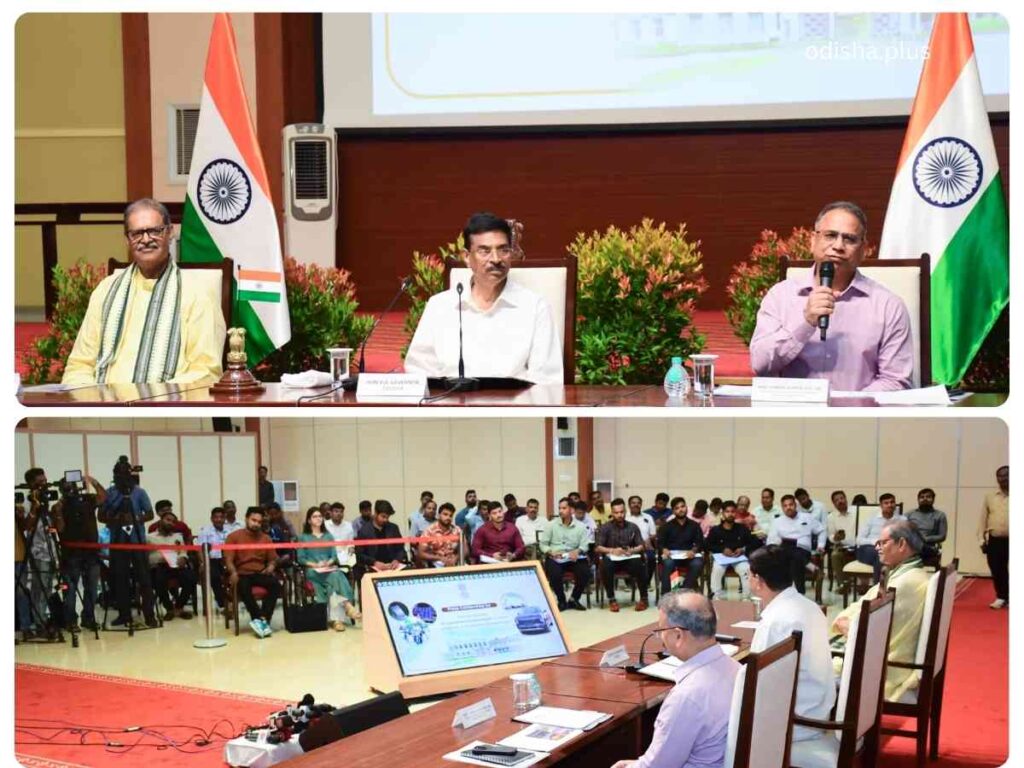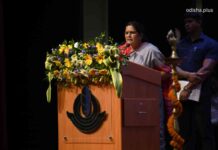In a strong push for environmental protection and sustainable living, Odisha Governor Dr. Hari Babu Kambhampati has urged citizens to embrace green energy to reduce pollution, safeguard the planet and to save much required foreign exchange by reducing import of crude oil.
OdishaPlus Bureau

Addressing a press conference at Raj Bhavan, the Governor emphasized the importance of transitioning from traditional energy sources to renewable alternatives. Since taking charge, Governor Kambhampati has initiated a transformative shift in the energy infrastructure of Raj Bhavan, Bhubaneswar.
A 150-kilowatt solar power plant is already operational within the premises, with an additional 400 kilowatts set to be installed soon. This marks a significant step towards making the Governor’s residence a net-zero energy campus. Furthering the green mission, a fleet of Made-in-India electric vehicles has been introduced—ranging from official cars to two-wheelers—signaling a decisive move towards sustainable mobility. “Every ride now contributes to a quieter, cleaner, and more responsible tomorrow. It’s more than a choice—it’s the path we’ve chosen to follow,” Dr. Kambhampati said, underlining the urgency of adopting eco-friendly practices. With this pioneering effort, Raj Bhavan is not only setting an example for government institutions across the country but also sending a clear message that sustainability begins at the top.
During the interaction with the media, The Governor also highlighted several major schemes introduced by the Government of India to promote renewable energy, such as:
• PM-KUSUM Yojana: Supports farmers in installing solar-powered pumpsets for tubewells used in irrigation.
• PM Surya Ghar: Muft Bijli Yojana: Aims to provide electricity to households through solar rooftop installations by offering subsidies.
• Central Govt. extends a subsidy of Rs 30,000 each for the first and second kilowatt and Rs 18,000 for the third kilowatt, per household.
• This financial assistance is available for installations up to a maximum capacity of 3 kW.
• In order to facilitate proliferation of the scheme in Odisha, the state government has also taken a proactive step by extending an additional subsidy of Rs 25,000 each for the first and second kilowatt and Rs 10,000 for the third kilowatt, per household.
• So, there is maximum subsidy of both central and State Govt. up to Rs 1,38,000/- for 3-Kilowatt Solar system.
Kambhampati appreciated the Odisha Government for providing an additional subsidy under the PM Surya Ghar scheme, stating that it will encourage more people to adopt solar energy. He urged citizens across the state to take full advantage of such initiatives and actively transition to renewable sources of energy—not just for personal benefit, but for the greater good of the environment. He also appealed to people to gradually shift away from petrol and diesel vehicles and adopt electric vehicles, highlighting that this transition is a crucial step toward reducing pollution, cutting dependence on fossil fuels, and supporting a cleaner, more sustainable future. Furthermore, he emphasized that charging electric vehicles with rooftop solar panels enables truly green mobility by eliminating the need for fossil fuels. “It also makes everyday travel significantly more affordable,” he noted.
He also stated, “Now is the time to take action. These efforts aim to empower people and build a better, lasting future for the next generations.” Dr. Kambhampati also called upon the media to play a proactive role in spreading awareness about renewable energy. “The objective of today’s interaction is to inspire citizens through awareness. The media serves as a crucial bridge in taking this vital message to every household,” he said.
Significantly, this is not the first time Dr. Kambhampati has championed renewable energy. As a Member of Parliament in 2014, he had strongly advocated for sustainable energy solutions during his maiden address in Parliament. While supporting the Union Budget presented by the then Finance Minister Arun Jaitley, Dr. Kambhampati had underscored the need to tackle India’s trade deficit by reducing dependence on imported crude oil and promoting the use of ethanol-blended fuel and electric vehicles. He had urged the government to offer tax incentives for electric vehicles and improve the domestic power situation through renewable energy like solar generators to reduce reliance on diesel generators, which would in turn help lower the current account deficit and conserve foreign exchange.
His visionary remarks in Parliament a decade ago reflected a deep understanding of the interlinkages between energy policy, economic stability, and environmental responsibility—principles he continues to uphold as the Governor of Odisha. Through both words and action, Dr. Hari Babu Kambhampati continues to lead by example, inspiring a shift toward a cleaner, greener, and more energy-secure future.
Deputy Chief Minister Kanak Vardhan Singh Deo, who was present at the event, lauded the green initiatives undertaken by Raj Bhavan and highlighted the various steps taken by the state government to promote renewable energy. He emphasized the importance of public participation in making Odisha a leader in sustainable development. The Principal Secretary of the Energy Department, Government of Odisha, Viishal Kumar Dev provided detailed insights into the ongoing government schemes and subsidy structures aimed at accelerating the adoption of renewable energy across the state. Principal Secretary to the Governor, N.B.S. Rajput, along with other senior officials of Raj Bhavan, was also present at the event.

























